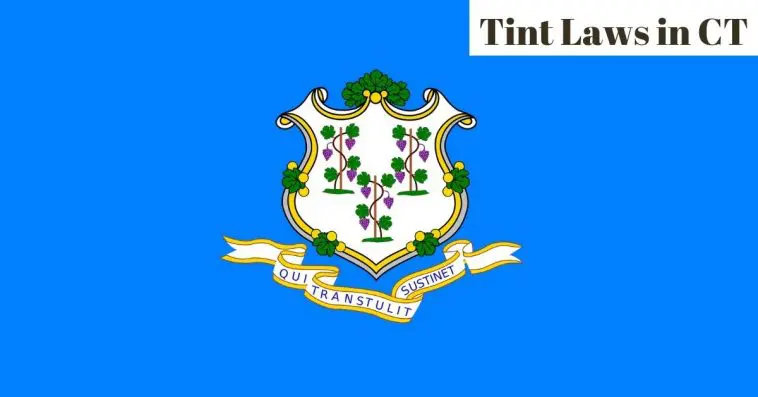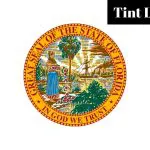The laws for window tinting in the state of Connecticut came into effect in the year 1994 and have been followed strictly ever since. Connecticut was the 24th state to enact these laws.
If you’re planning on purchasing a passenger vehicle or multi-purpose vehicle in Connecticut, you’ll be doing yourself a favor by familiarizing yourself with its tinting laws.
Such information would be especially useful for those residing in inland Connecticut, which can see temperatures soar during peak summer.
In the following sections, we’ll go through everything you’d need to know about getting your windows tinted in Connecticut.
TABLE OF CONTENTS
Are You Allowed To Have Tinted Windshield And Windows In Connecticut?
Simply put, yes, you are allowed to tint your windshield and windows in the state of Connecticut. However, there are limits for the same. In the case of your windshield, you’re allowed to tint only the upper portion, at or above the AS-1 line.
As for the windows, there are separate specifications for both back side windows and front side windows. There are also different limits on windows of passenger vehicles and multi-purpose vehicles. We’ll discuss these in detail in the following sections.
What Is The Darkest Tint You Can Legally Get In CT?
Legally, the darkest tint you can get for your passenger vehicle in Connecticut is a tint of any darkness. However, this does not apply to all windows of all kinds of vehicles.
The limitless tint is for the rear and back windows of multi-purpose vehicles only. The darkest tint you can legally get for your front side and backside windows for a passenger vehicle is restricted to 65%.
Is 20% Tint Illegal In CT?
If you’re talking about passenger vehicles, then yes, a 20% tint is illegal. This is concerning the front side and backside windows of your vehicle. The same applies to your windshield as well. A 20% tint is legal for the rear window of passenger vehicles.
As for multi-purpose vehicles, a 20% tint is illegal for the front side windows and windshield. Any tint darkness is allowed for the backside and rear window for multi-purpose vehicles.
Can You Get Pulled Over For Tinted Windows In Connecticut?
Yes, police officers can pull you over for having tinted windows in Connecticut. However, this is only if an officer finds your tint is darker than the permissible limit.
They usually have a device that helps them determine how much tint you’ve got on your windows. Even if they don’t have such a device on them, they’re trained to ascertain your tint darkness with the naked eye.
So, if you get pulled over, chances are that the officer in question believes you’ve exceeded the tint darkness limit.
How Much Is A Tint Ticket In CT?
For a first offense, a law enforcement officer will generally issue you with a warning ticket in the state of Connecticut. A second offense is sure to get you a ticket that can cost you $250 or more.
This is higher than most other states which is why you’re strongly advised to tint your windows well within the legal limits.
Window Tint Darkness In Connecticut
The tint darkness for your vehicle is measured using VLT or Visible Light Transmission percentage. This percentage essentially determines the amount of visible light that can pass through your windows.
The allowable VLT% varies for multi-purpose vehicles and passenger vehicles in Connecticut, as it does in other states. We’ll examine the tint darkness allowed for both of these instead of the VLT% below.
For Passenger Vehicles
- Windshields can have any non-reflective tint that’s at or above the AS-1 line
- Front Side Windows can have a maximum tint of 65%
- Back Side Windows can have a maximum tint of 65%
- Rear Window can have any amount of tint
For MPVs (Multi-Purpose Vehicles)
- Windshields can have any non-reflective tint that’s at or above the AS-1 line
- Front Side Windows can have a maximum tint of 65%
- Back Side Windows can have any amount of tint
- Rear Window can have any amount of tint
Window Tint Reflection In Connecticut
Tinted film can restrict the glare of the sun as it filters through your windows. This in turn can reduce the amount of heat that enters your car. Though not all states permit vehicle-owners to add reflective properties to their tint, Connecticut does.
Let us examine the limits regarding window tint reflection for passenger vehicles and multi-purpose vehicles in Connecticut.
For Passenger Vehicles
- Front Side Windows can have a maximum of 21% tint reflection
- Back Side Windows can have a maximum of 27% tint reflection
For MPVs (Multi-Purpose Vehicles)
- Front Side Windows can have a maximum of 21% tint reflection
- Back Side Windows can have a maximum of 27% tint reflection
How Do You Get A Medical Exemption For Window Tint In Connecticut?
You can get a medical exemption in Connecticut to increase your tint from 65% to 80%. However, you will need to get a tint that allows not less than 20% of light to pass through your windows.
To get the aforementioned exemption, you’ll need to present medical evidence that you suffer from a light-sensitive skin condition or an auto-immune disease. The state will then issue you with an exemption certificate.
You’re required to carry this certificate with you at all times to avoid being issued a ticket by a law enforcement officer.
Conclusion
In conclusion, Connecticut is one of the more lenient states in the US in terms of window tinting laws and regulations. Though the fine levied on crossing the tint limit is hefty, the cases of a fine collection with regards to window tinting are few and far in between.
Since the laws differ on the tinting limits for passenger vehicles and multi-purpose vehicles, you’ll need to make sure you know each of these to avoid getting into trouble with law enforcement authorities.
Paying a heavy fine for having excessively tinted windows is completely avoidable so do your best to stay in line with the law. For more information on Connecticut’s tinting laws, you can refer to this article.




